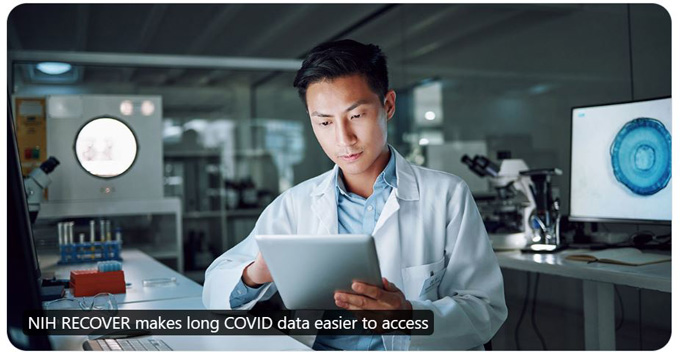Deidentified data from thousands of adults with long COVID are now available to researchers.
April 26, 2024 - Secure data from more than 14,000 adults who participate in National Institutes of Health observational research on long COVID are now available to authorized researchers through BioData Catalyst (BDC). BDC is a cloud-based ecosystem developed by the National Heart, Lung, and Blood Institute (NHLBI), part of NIH, to accelerate research on heart, lung, blood, and sleep disorders. The research on long COVID — broadly defined (link is external) as signs, symptoms, or conditions that persist or develop for at least four weeks after an infection from the virus that causes COVID-19 — is provided through the NIH Researching COVID to Enhance Recovery (NIH RECOVER) Initiative.
By giving researchers access to secure data, analysis tools, and resources, the BDC ecosystem aims to spur scientific innovation, collaboration, and discovery, while providing a platform for sharing data and validating results. The addition of RECOVER data to BDC can help investigators identify and explore long COVID connections that may benefit from or inform future studies.
Authorized researchers can now request access to a subset of data from adults in the observational RECOVER cohort. These data include information from more than 92,000 study visits collected between Oct. 29, 2021-Sept. 15, 2023, at 79 locations throughout the United States. New RECOVER data, including data from other studies, will be added to BDC at regular intervals.
As investigators seek to better understand, diagnose, and treat long COVID, many critical questions remain. By making RECOVER data more accessible by adding it to a central ecosystem, experts aim to find answers sooner.
About RECOVER: The National Institutes of Health Researching COVID to Enhance Recovery (NIH RECOVER) Initiative is a $1.15 billion effort, which is supported in part through the American Rescue Plan Act of 2021. It seeks to identify how people recuperate from COVID-19 and who is at risk for developing post-acute sequelae of SARS-CoV-2 (PASC). Researchers are also working with patients, clinicians, and communities across the United States to identify strategies to prevent and treat the long-term effects of COVID, including long COVID. For more information, please visit recovercovid.org (link is external).
About the National Heart, Lung, and Blood Institute (NHLBI): NHLBI is the global leader in conducting and supporting research in heart, lung, and blood diseases and sleep disorders that advances scientific knowledge, improves public health, and saves lives. For more information, visit https://www.nhlbi.nih.gov.
About the National Institutes of Health (NIH): NIH, the nation's medical research agency, includes 27 Institutes and Centers and is a component of the U.S. Department of Health and Human Services. NIH is the primary federal agency conducting and supporting basic, clinical, and translational medical research, and is investigating the causes, treatments, and cures for both common and rare diseases. For more information about NIH and its programs, visit www.nih.gov.
NIH…Turning Discovery Into Health®
Source: NIH









